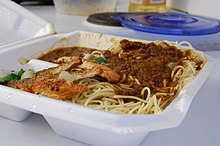Embark on a Flavorful Journey: Somali Food Beyond Borders
Wiki Article
From Staple Cuisines to Exotic Specialties: Unraveling the Diverse and Vibrant World of Somali Food

Conventional Somali Staples
If you desire to experience genuine Somali cuisine, you should regularly delight in typical Somali staples. These staples form the structure of Somali cooking and showcase the rich social heritage of the Somali individuals. One such staple is the preferred flatbread referred to as "injera." Made from a fermented batter of teff flour, injera is a flexible and necessary component of Somali meals. It is commonly used as an utensil to scoop up sauces and stews, including a distinct appearance and taste to each bite.An additional staple is "baasto," a savory pasta recipe that is frequently appreciated in Somali families. Baasto is normally made with pastas or linguine noodles, cooked until tender and afterwards combined with an aromatic sauce made from tomatoes, onions, garlic, and a mix of typical Somali spices (Somali food). This meal is typically served with a side of maraq, a delightfully spiced broth that includes deepness and intricacy to the dish
Finally, "bariis" or rice is a staple that is deeply ingrained in Somali food. Bariis is typically prepared with fragrant flavors such as cardamom, cinnamon, and cloves, giving it a wonderful scent and taste. It is commonly offered with a variety of meat or veggie stews, creating a gratifying and hearty dish.
Flavors From the Sea: Somali Seafood Delicacies

One popular seafood special is Isku-dheh karis, a creamy curry made with fish, coconut milk, and an assortment of spices. The meal is usually served with great smelling basmati rice or a flatbread called injera. One more favored is Muqmad, a dried out fish recipe that is commonly taken pleasure in as a snack or utilized as an ingredient in other meals. The fish is cured with salt and flavors, offering it a a little appetizing and mouthwatering taste.
Lahoh with maraq is a traditional Somali pancake offered with a rich fish and shellfish stew. The pancake is mushy and soft, while the stew is made with a combination of shellfishes, fish, and vegetables, simmered in a savory brew. This dish is a true depiction of the seaside flavors found in Somali cuisine.
Whether it's grilled lobster, spicy shrimp curry, or zesty calamari, Somali seafood delicacies are a must-try for any kind of seafood lover. The quality of the ingredients, combined with the aromatic spices, develop a harmony of flavors that will move your preference buds to the coasts of Somalia. So, don't miss out on the possibility to relish the sea's plentiful treasures when exploring Somali cuisine.
Unique Spices and Fragrant Natural herbs
Discover the alluring variety of flavors in Somali food with using a remarkable range of exotic seasonings and aromatic natural herbs. Somali food is known for its bold and vivid flavors, and these seasonings and natural herbs play a crucial role in creating the distinctive preference that sets Somali cuisine apart.One of the most typically used seasonings in Somali cooking is cumin. Turmeric extract, with its lively yellow color and moderate flavor, is another staple in Somali cuisine.
Cardamom, an aromatic spice with a tip of citrus, is likewise widely utilized in Somali cooking. It adds a one-of-a-kind and aromatic touch to both sweet and tasty dishes. Various other popular flavors include cinnamon, cloves, and coriander, which are made use of to add warmth you could try this out and intricacy to numerous dishes.
Aromatic natural herbs like mint, cilantro, and parsley are additionally key ingredients in Somali food. They are made use of to garnish dishes, imparting freshness and a ruptured of taste. These natural herbs are typically contributed to sauces, salads, and meat dishes, enhancing the total preference and scent.
With using these unique seasonings and fragrant herbs, Somali food supplies a genuinely one-of-a-kind and alluring eating experience. The mix of tastes creates an unified balance that is both satisfying and remarkable. Whether you're delighting in a standard Somali stew or a tasty rice dish, the seasonings and natural herbs made use of in Somali food preparation make certain to leave a lasting perception on your palate.
Influences From Arab, Indian, and European Foods
Arab, Indian, and European cuisines have actually considerably affected the vivid and diverse world of Somali food. Over the centuries, Somalia's strategic place on the Indian Sea profession routes has actually enabled an abundant exchange of cooking and social practices with neighboring Arab and Indian communities, along with European colonial powers. These communications have actually left a lasting effect on the Somali culinary landscape, causing a fusion of flavors and strategies that make Somali food truly unique.
One of the most substantial influences can be seen in the substantial use of seasonings in Somali food preparation. Arab and Indian seasonings such as cumin, coriander, cardamom, cinnamon, and cloves are commonly made use of to add depth and intricacy to Somali recipes. The introduction of these flavors has not just boosted the flavors however has actually additionally added to the fragrant and dynamic nature of Somali cuisine.
European impacts can be mapped check these guys out back to the colonial age when Somalia was under the control of numerous European powers, including the Portuguese, British, and Italians. These early american interactions brought new active ingredients and cooking techniques to Somalia. Pasta dishes like "baasto" (Somali pasta) and "sabayad" (a Somali flatbread) are clear examples of Italian influence.
Commemorating Food in Somali Culture
1. Celebrating food is an indispensable component of Somali society, where common dishes and cheery events are cherished traditions. Food plays a main function in bringing people together, promoting a feeling of community and connection. Whether it's a wedding celebration, a spiritual vacation, or a straightforward household celebration, Somali individuals take enormous satisfaction in their cuisine and use it as a way to celebrate check out this site and share their social identity.
In enhancement to the tasty food, the act of sharing a dish is deeply meaningful in Somali society. It signifies hospitality, generosity, and the importance of area. Somali food. Taking a seat with each other, frequently on a floor covering or a communal plate, and breaking bread promotes a sense of unity and strengthens bonds between household and buddies
Moreover, food is additionally a way to keep in mind and honor liked ones that have passed away. During unique occasions, such as the Islamic vacation of Eid al-Fitr, Somalis prepare standard sweets called xalwo as a way of commemorating their ancestors and maintaining their memory active.
Conclusion
In final thought, Somali food offers a diverse and vibrant culinary experience. From typical staples to unique specialties, the food is rich in tastes and showcases the nation's social influences. With a range of seafood delicacies, aromatic natural herbs, and seasonings from Arab, Indian, and European foods, Somali food is a celebration of flavors and practices. So, whether you're discovering the staple meals or venturing into the world of exotic specializeds, Somali cuisine makes sure to entice your palate.If you want to experience authentic Somali cuisine, you must regularly indulge in typical Somali staples.To genuinely submerse yourself in the dynamic and diverse globe of Somali food, you ought to often indulge in the beautiful tastes of Somali fish and shellfish delicacies. Whether you're appreciating a typical Somali stew or a delicious rice recipe, the herbs and seasonings used in Somali food preparation are certain to leave a lasting perception on your preference buds.
These communications have left a long-term impact on the Somali culinary landscape, resulting in a fusion of tastes and methods that make Somali food absolutely distinct.
Pasta dishes like "baasto" (Somali pasta) and "sabayad" (a Somali flatbread) are clear examples of Italian impact.
Report this wiki page